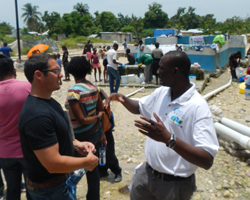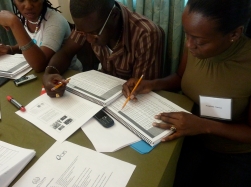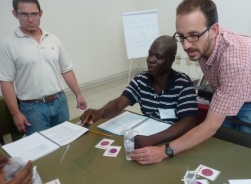Villanova Engineers Partner with CRS to Deliver Environmental and Infrastructure Training in Haiti

As the Haitian people continue to rebuild their land and lives in the wake of the 7.0-magnitude earthquake that ravaged the country in 2010, challenges surrounding sanitation, public health, environmental management, and infrastructure persist. In response, a team of Villanova Engineers and partners from around the University collaborated with Catholic Relief Services (CRS) to develop a training program in support of the organization’s Water, Sanitation and Health (WASH) initiatives in Haiti in May.
“These initiatives, which focus on training and capacity building, will help local engineers make better decisions during this transitional period. Financial resources and goodwill can only go so far, but education is key to bringing Haiti back from the devastating disaster of January 12, 2010,” says Jordan Ermilio, Director of the Engineering Service Program and project initiator.

The Villanova team included faculty members from the College of Engineering who created pre-recorded video lectures on various topics. Dr. Gerard Jones, Associate Dean for Academic Affairs and Professor of Mechanical Engineering; Frank Falcone, Associate Professor of Civil and Environmental Engineering; and James O’Brien, Assistant Professor of Mechanical Engineering, prepared lectures. Dr. Seth Whidden, Associate Professor of French, joined Ermilio in implementing the training on-site. A team of alumni volunteers, who assisted with various activities in Haiti, included Daniel Cain CE’09, Theresa Donohoe A&S ’12, and Kathryn Harter A&S ’12.
Upon arrival in Port au Prince, the team spent a day in the field with local engineers, visiting four sites to investigate problems the WASH program is addressing. From there, they conducted a three-day workshop consisting of in-class activities on topics specific to designing and implementing WASH projects for 27 local staff members working on environmental management and infrastructure projects with CRS in Haiti.
The workshop included presentations, discussions and activity labs, case studies, and pre-recorded video presentations. Lectures covered topics including environmental health (focusing on Haiti’s health profile in a global landscape), environmental sanitation, solid waste management, water resources, water supply and demand, water quality, water treatment technology, and water supply infrastructure. A significant emphasis was placed on developing the skills of local engineers with respect to designing systems to address water distribution, wastewater management (sanitation), and municipal waste disposal (solid waste management) problems. Participants also learned field techniques for estimating the supply and demand for water supply and sampling and analysis for determining water treatment requirements.

All lectures and training materials were shared in both English and French, with help from Dr. Whidden and his class of French students, who spent the spring semester translating materials in their Service Learning Internship course through the Department of French and Francophone Studies in the College of Liberal Arts and Sciences. Each participant received hard copies of all training materials, electronic files, and a certificate of completion at the end of the program.
"Special recognition also goes to Dr. Sue Toton, Associate Professor of Social Ethics, Development Ethics, Justice Education, and Dr. Barbara Wall, Vice President for Mission & Ministry and Associate Professor of Philosophy, who helped with funding for this project,” says Ermilio. “We are also grateful to Dauda Sanou and Dr. Carl Stecker from CRS-Haiti, who provided for all of our in-country logistical needs.”
The in-country workshop represented the culmination of a yearlong collaborative effort between Villanova and CRS and received high marks from participants, who evaluated the program’s lecture topics and methods of presentation very favorably. Moving forward, the team hopes to secure external funding to support additional training seminars for WASH and other similar initiatives, depending on need, which may include the areas of engineering, business, or health. They also hope to identify research opportunities to investigate the long-term sustainability of post-emergency and transitional development projects in Haiti, while also developing multidisciplinary projects for students to pursue.
